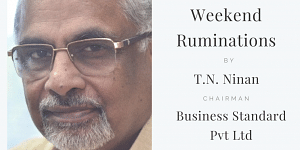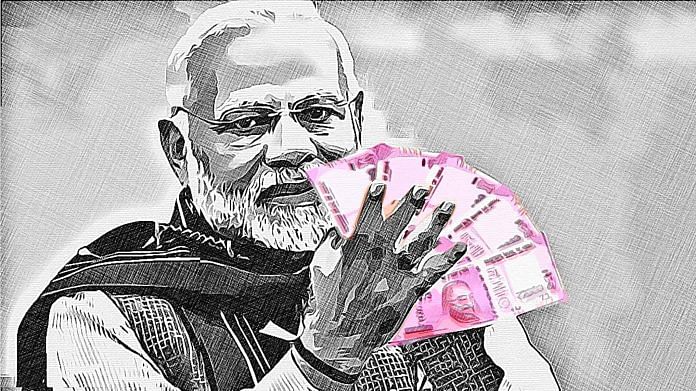In 2014, Arun Jaitley mentioned the “neo-middle class” in the first paragraph of his budget speech, and at least twice more before he had finished. Last week, in contrast, the high point of Piyush Goyal’s speech was an ambitious hand-out programme for 120 million farming families. From focusing on the “aspirational”, the government has gone “aam aadmi” with a vengeance.
And yet, during the intervening five years, per capita income went up by about a third — more than in any other country. It is inevitable that the benefits of growth were distributed unevenly, but poverty levels halved in the decade to 2015-16, according to a recent UN report that used the Multidimensional Poverty Index. Some 270 million people (nearly a quarter of the population) moved out of poverty during this period. Meanwhile, half the country now owns smart phones and internet usage per smart phone has shot up from minuscule to among the highest in the world.
 Almost as impressive, some 90 million scooters and motorcycles were bought in these last five years, and 40 million in the previous three years, making for a total of 130 million since 2011, when, according to the Census, one in five families already owned a powered two-wheeler. Today, the figure must be one in two families. Further up the ladder, two-thirds of a million people flew every day last year, about 25 times the number that flew before aviation was opened up to private airlines. If we are talking “aspiration”, surely something has been achieved.
Almost as impressive, some 90 million scooters and motorcycles were bought in these last five years, and 40 million in the previous three years, making for a total of 130 million since 2011, when, according to the Census, one in five families already owned a powered two-wheeler. Today, the figure must be one in two families. Further up the ladder, two-thirds of a million people flew every day last year, about 25 times the number that flew before aviation was opened up to private airlines. If we are talking “aspiration”, surely something has been achieved.
So what explains the shift back from neo-middle class to aam aadmi, with the flavour of the season being loan write-offs, tax rebates and cash handouts? It sounds very much like being back in 1971 with its battle-cry of “garibi hatao” — though per capita income today is seven times what it was then. There is a difference, of course. The first Mrs Gandhi’s programme focused on hitting the rich with killer taxes and expanding the reach of the state, while the second Mrs Gandhi had the poor as the focus of her welfarism. Narendra Modi was right in describing the rural employment guarantee programme as a symbol of long-term Congress failure, but he has just given it a record outlay. And under the right-to-food programme, grain is still being distributed at nearly the price that delivered electoral victory to N.T. Rama Rao in 1983 — as though the nominal incomes of the poor have stood still over 36 years. Not so; today’s family can buy a month’s requirement of grain with a single day’s wage.
Also read: Farmers could get cash handout from Modi ahead of the 2019 Lok Sabha elections
Yet, the political class has unanimously settled on more welfarism as the need of the hour. Duality is one explanation, specifically that the country has not been able to create enough non-farm (therefore better-paying) jobs. Disruption would be the other explanation, caused first by demonetisation and second by the goods and services tax, added to which there is distress in farms because producer prices have fallen. Modi would not admit to the second, but he also disputes the first, as he spelt out at length in his speech in the Lok Sabha Thursday, and you have to accept that there was logic in his argument. But you could turn his other proposition on its head, and argue that the very success of the Mudra loan refinance programme (wherein job-seekers try to become job-creators) suggests disruption. In any case, the government’s actions suggest that it buys the entire narrative of duality, disruption and farm distress.
Perhaps it is nothing more than pre-emptive precaution in an election year, but one can glean motives from action taken. A welfare state makes sense if it means the state providing education and health care for all. Alternatively, handouts are affordable in a lower-middle income economy if you divert money from the less deserving, or if the promised benefits are not open-ended so that you don’t get a runaway bill. Without any of these, the old question begs an answer: Should you give a man fish, or teach him how to fish? Lurking hidden in the new bout of welfarism seems to be an admission that the state can’t deliver for the poor anything other than cash.
Also read: How a dangerously low poverty line is causing India more harm
By Special Arrangement with Business Standard




The congress or the entire opposition should grab the chance quickly. BJP is making too much of 6000 rupees to 12 crore farmers. Now, 5 acre of land is actually quite a sizable piece of land. A farmer who owns so much land will have a noticeable middle-class lifestyle — gadgets at home, a tractor of his own, and also a car and a few bikes. 500 rupees to him is actually an insult (only the fools like the BJP could think that it will make the recipient grateful enough to go and vote for them).
The opposition should catch hold of 200-300 such farmers, and make them speak to the press that they don’t feel helped but insulted. And the usual accompanying shenanigans to catch the eye of a large number of TV viewers. “BJP ne hamare saath fraud kiya hai, hamari bezzati ki hai” and stuff like that.
The only difficulty with this approach is that there are no plump salmon or blue fish tuna. Just a few pieces of Bombay duck, not smelling very fresh. Will five hundred rupees per month suffice to change electoral fortunes …
Mr Ninan,
Business Standard for me being more than a newspaper has been to habit. The only reason it continues is that your competition is worse than you and reading a business newspaper is for me a necessity in my profession. So by default the habit continues.
A few weeks back you had written in your weekend ruminations about Modi not being a great reformer and liberalizer. And the example you had quoted in contrast was of Emanuel Marcon of France. Any change in views after the rioting in France for weeks now. Would like to hear your views now.
Anything other than socialism is not acceptable by the polity and people. So all leaders do the same failed socialism for the poor.